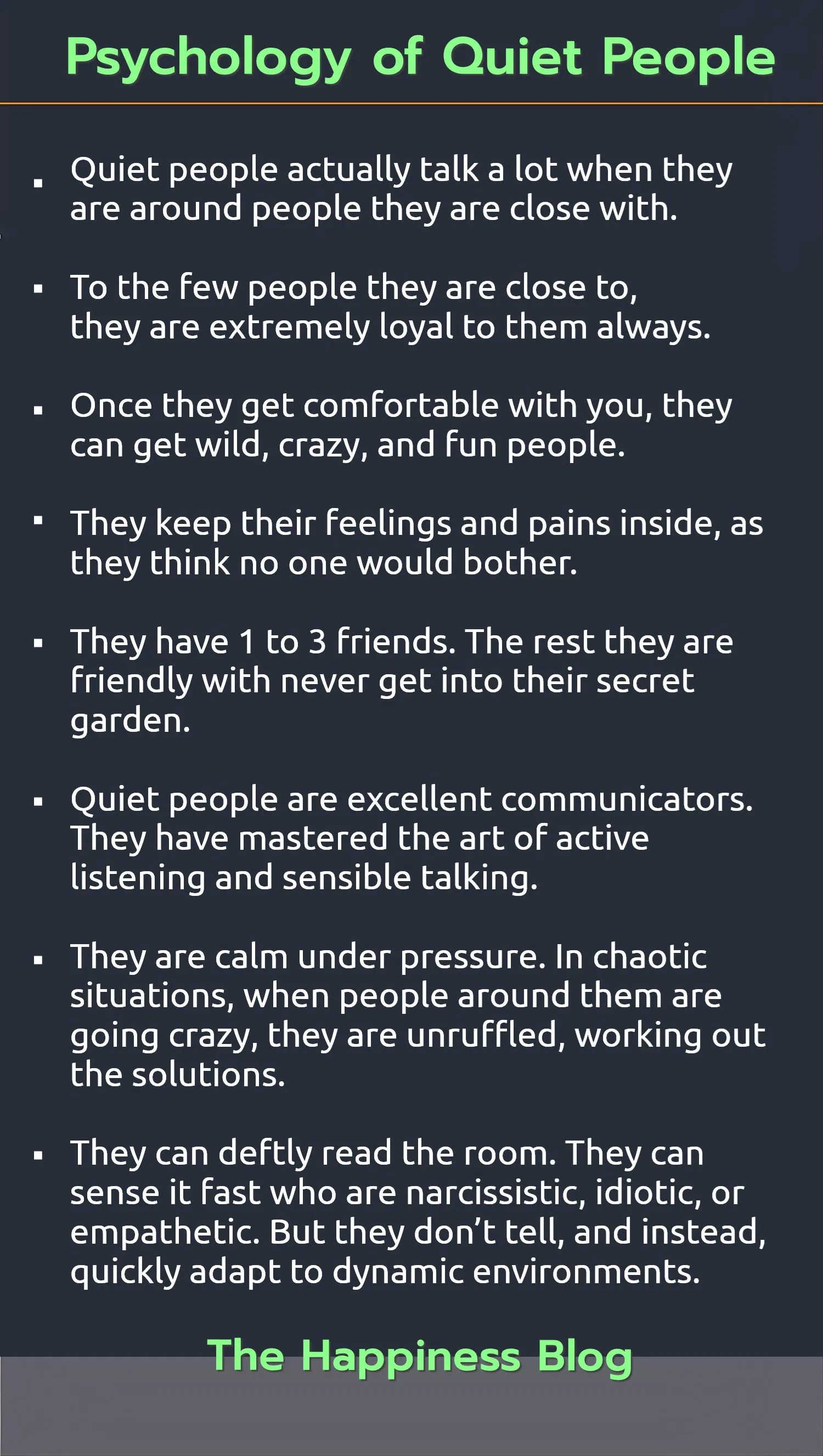Today's Thursday • 10 mins read
Quiet people are often stereotyped. Many see them as strange, lacking social skills, or people who hate people. But the truth is quite different.
Read on to discover how these people are much more than you may have expected.
10 Psychology Facts About Quiet People
- Quiet people actually talk a lot when they’re around people they are close with.
- To the few people they are close to, they are extremely loyal to them always.
- Once they get comfortable with you, they can get wild, crazy, and fun people.
- They keep their feelings and pains inside, as they think no one would bother.
- They have 1 to 3 friends. The rest they are friendly with never get into their secret garden.
- Quiet people are excellent communicators. They have mastered the art of active listening and sensible talking.
- They are calm under pressure. In chaotic situations, when people around them are going crazy, they are unruffled, working out the solutions.
- They can deftly read the room. They can sense it fast who are narcissistic, idiotic, or empathetic. But they don’t tell, and instead, quickly adapt to dynamic environments.
- They are deep thinkers and creative innovators. They often surprise you with their unique and valuable insights.
- They are wise mentors, empathetic leaders, collaborative teammates, and inspiring friends.

A brief psychological explanation of each point above about quiet people:
- Quiet people actually talk a lot when they are around people they are close with: This behavior reflects the core of introversion. Introverts’ social energy isn’t about the number of interactions, but the depth. Social interaction, especially with unfamiliar individuals, can be draining for introverts, as it requires significant cognitive effort. However, with close companions, this cognitive load decreases dramatically. They feel safe, understood, and accepted without needing to constantly monitor their behavior or manage social anxiety. This allows them to relax, express themselves freely, and engage in more extended conversations. Psychologically, this underscores their need for secure attachment and the restorative power of intimate relationships for introverts.
- To the few people they are close to, they are extremely loyal to them always: This loyalty stems from the selective nature of their social connections. Because introverts invest deeply in a smaller circle, those relationships hold immense value. The effort and time invested in building trust and rapport with these few individuals create strong bonds. From a psychological standpoint, this reflects a preference for quality over quantity in relationships. They prioritize meaningful connections and are willing to invest significant emotional resources to maintain them. This deep investment translates into unwavering loyalty and support.
- Once they get comfortable with you, they can become wild, crazy, and fun people: This observation aligns with the idea that introversion is not synonymous with shyness or social anxiety. When introverts feel safe and accepted, they shed their guarded exterior. The “wild, crazy, and fun” persona is not a hidden personality but rather an expression of their authentic selves unleashed in a secure environment. Psychologically, this highlights the role of social context in shaping behavior. When the threat of judgment or misunderstanding is removed, introverts can fully express their playful, energetic side.
- They keep their feelings and pains inside, as they think no one would bother: This behavior can be rooted in several psychological factors. Some quiet individuals may have experienced past invalidation or dismissal of their emotions, leading to a learned reluctance to share. Others may fear burdening others with their problems or perceive vulnerability as weakness. From a psychodynamic perspective, this could be seen as a defense mechanism to protect themselves from further emotional pain. This tendency to internalize emotions can have negative consequences for mental well-being, highlighting the importance of fostering safe spaces for emotional expression.
- They have 1 to 3 friends. The rest they are friendly with never get into their secret garden: This reflects the introvert’s preference for deep, intimate connections over a wide network of superficial acquaintances. The “secret garden” represents their inner world – their thoughts, feelings, and vulnerabilities – which they only share with a select few trusted individuals. Psychologically, this demonstrates their need for privacy and control over their emotional intimacy. It’s not about being unfriendly or aloof, but about prioritizing the depth and authenticity of their relationships. The few they allow into their “garden” are those they trust implicitly and with whom they feel a deep sense of connection.
- Quiet people are excellent communicators. They have mastered the art of active listening and sensible talking: This strength stems from their preference for thoughtful processing. Because they spend more time listening and observing, they develop a keen understanding of nonverbal cues and the nuances of communication. Active listening, a core component of their communication style, involves fully concentrating on what is being said, understanding the message, responding thoughtfully, and remembering what is said. Their “sensible talking” reflects their tendency to choose words carefully and avoid unnecessary chatter. This indicates that they require a higher level of cognitive processing when it comes to communication. They want to be clear, accurate, and empathetic in their responses.
- They are calm under pressure. In chaotic situations, when people around them are going crazy, they are unruffled, working out the solutions: This composure under pressure is often attributed to their internal focus and lower reactivity to external stimuli. While others may become overwhelmed by sensory overload or emotional contagion in chaotic situations, quiet individuals can maintain a sense of inner calm. This allows them to think clearly, assess the situation objectively, and devise effective solutions. From a neurological perspective, this could be linked to differences in their autonomic nervous system responses, with less pronounced “fight-or-flight” reactions.
- They can deftly read the room. They can sense it fast who are narcissistic, idiotic, or empathetic. But they don’t tell, and instead, quickly adapt to dynamic environments: This “reading the room” ability is a product of their keen observation skills and heightened awareness of social dynamics. They are adept at picking up on subtle cues in body language, tone of voice, and interpersonal interactions. Their reluctance to openly judge others, even when they recognize negative traits like narcissism, reflects their preference for avoiding conflict and maintaining social harmony. Their adaptability stems from their capacity for careful observation and strategic thinking, enabling them to navigate complex social situations effectively. Psychologically, this showcases their high social intelligence and emotional intelligence.
- They are deep thinkers and creative innovators. They often surprise you with their unique and valuable insights: This creativity and insightful thinking are rooted in their preference for introspection and deep processing. Spending time in quiet contemplation allows them to explore ideas thoroughly, make connections that others might miss, and generate original solutions. Their insights often surprise others because they are not the product of impulsive brainstorming but rather the result of careful reflection and analysis. Psychologically, this highlights the link between introversion and creative thinking, suggesting that solitude and focused attention can foster novel ideas and perspectives.
- They are wise mentors, empathetic leaders, collaborative teammates, and inspiring friends: These qualities are a natural extension of their other traits. Their active listening skills, empathy, and thoughtful communication style make them effective mentors and leaders. Their collaborative nature stems from their ability to listen to diverse perspectives and create inclusive environments. Their deep connections and unwavering loyalty make them inspiring friends. Psychologically, these roles reflect their capacity for building strong relationships, fostering growth in others, and contributing meaningfully to group dynamics. Their quiet strength and thoughtful approach can have a profound positive impact on those around them.
7 Typical Traits of Quiet People
These 7 specific behaviors of quiet people will tell you a lot about their secret:
1. They Do A Mental Rehearsal Before Speaking
Quiet people often seem to take a little longer to answer questions or join conversations. Don’t misjudge them for being slow. It’s also not because they don’t have anything to say!
They look at a piece of information from several angles before responding. This is actually their sincere attempt to give you an accurate and logical reply.
It’s more like they’re doing a mental rehearsal before they speak. Imagine practicing your dialogs in a play before performing it on stage – that’s kind of what they’re doing in their heads.
They’re carefully considering what they want to say and how they want to say it. They like to get it right the first time rather than just blurting things out.

2. They Prefer Small Groups Because…
Big parties or huge crowds can be draining for quiet people.
It’s not that they dislike people; they just prefer smaller groups or even one-on-one conversations.
Think of it like this: a big party is like a loud rock concert – exciting for the extroverts until the lights are off, but overwhelming for introverts after a some time.
So, after a few hours of stimulation (of being around people talking), their brains switch off, craving time alone. Once they have had their rejuvenating solitude, they are ready to socialize again.
A quiet conversation with a close friend is like listening to your favorite song on headphones – more personal and enjoyable. They appreciate deeper connections with a few people rather than lots of shallow interactions.
3. They Are That Silent Detective
Quiet people are often great observers. They pay attention to details that others might miss.
They’re like silent detectives, taking in all the clues around them.
While others are busy talking, they’re watching body language, listening to tone of voice, and noticing the little things that give them a better understanding of what’s going on.
This makes them good at reading situations and understanding people.
4. They Need Downtime Before Plugging Back In
After spending time in social situations, even small ones, quiet people often need some alone time to recharge.
Imagine your phone battery running low. You need to plug it in to get its power back.
Quiet people are similar. They need some time to themselves – reading a book, listening to music, or just relaxing – to get their energy back after being around others.
This isn’t being rude; it’s how they stay balanced.
5. They’d Rather Write Than Talk
Sometimes, quiet people find it easier to express themselves through writing, drawing, music, or other forms of art.
It’s like finding another way to communicate. Instead of talking, they might write a poem, paint a picture, or play an instrument.
These outlets allow them to share their thoughts and feelings in a way that feels more comfortable and natural.
6. They Naturally Dive Deep About Things
Quiet people tend to be deep thinkers.
They don’t just skim the surface of things; they like to go deeper. They ponder big questions, analyze situations, and try to understand the world around them.
This can make them great problem-solvers and creative thinkers. They prefer to explore ideas thoroughly rather than just accepting things at face value.
7. They Are The Best Listeners Among All You Know
One of the best qualities of quiet people is that they’re usually excellent listeners. When someone is talking to them, they give their full attention.
They’re not just waiting for their turn to speak; they’re genuinely interested in what the other person has to say.
This makes them great friends and confidants because people feel heard and understood by them.
Final Words
My advice for introverts:
- Declare you are an introvert at the first meeting — don’t let them make misjudge you as shy.
- Don’t listen to an extrovert who tells you to become like them — they don’t know what it is like to be you.
√ Also Read: How To Safely Make Someone Fall In Love With You (No Tricks)
√ Please spread the word if you found this helpful.
• Our Story!
